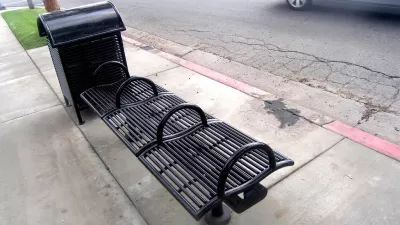World
Global issues, U.N., etc.
Liberating High-Quality Home Design
Does not having the money to hire a world-class architect mean you shouldn't be able to build a well-designed house? A new website seeks to make high-quality design accessible to the masses with open source architecture.
New Study Challenges 2 Degree Climate Change Cap
New studies published this week challenge the 2 degree Celsius global warming threshold and call for an early warning system to monitor climate shifts.

The Sneaky Ways Cities Alter Our Behavior
If you think your city is doing all it can to make its public spaces pleasant for all residents, think again. From “pig’s ears” to the "Camden Bench", Frank Swain explores the "secret tricks" cities use to make spaces uncomfortable and unattractive.
13 Ways to Kill Your Community
Scott Doyon reviews the book "13 Ways to Kill Your Community", by Alberta Legislative Assembly member Doug Griffiths and journalist Kelly Clemmer. In it, the authors reveal some of the "curiously recurring behaviors" that harm cities of all sizes.
Ranking Architects' Favorite Architects
BD is out with its annual list of the architecture firms most admired by their colleagues. A number of large commercial practices joined avant-garde firms in the top 10.
New Visualization Tools Simulates Street Designs in 3D
Having a hard time selling a street re-design to skeptical stakeholders? Try “Unity3D Visualization”, a design simulation tool created by a Portland-based video game designer that lets viewers interact with proposed environments in three-dimensions.
A Look at the Remarkable Career of Laurie Olin
The tenth entry in the Cultural Landscape Foundation's award-winning Pioneers of American Landscape Design series features the renowned landscape architect Laurie Olin, recent winner of the National Medal of the Arts.
Friday Funny: Join the Party Bike Revolution
Ever feel like the bar-on-wheels revolution is passing you by? Fear not, your opportunity to become a part of the party bike industry is here.
10 Lessons From 'Un-Smart' Cities
Technology company Ericsson has published its 2013 list of the world's cities with the best information and communications technology (ICT) networks, but there are also good things happening in the cities with the least developed networks.
Confronting Our Culture of Overconsumption
Just in time for America's "annual season of excess", Lee Epstein looks at the well hidden consequences of our insatiable appetites.
30 Examples of Public Housing at its Best
At its best, public housing shouldn't just provide a roof and four walls, but utilize creative design to make low-cost buildings feel like high-quality homes. These 30 projects from across the world have found unique ways to meet that challenge.
Predictability v. Flexibility
Just about everything we screw up as individuals and organizations has to do with our determination to optimize both extremes of predictability and flexibility, writes Ben Brown
Could SimCity Become a "Swiss Army Knife for Teachers"?
Following a path blazed by Oregon Trail and other classic educational video games, SimCity is hoping to become a common classroom tool. Thousands of students are testing a tailored version of the game, and the results are promising.
This is Your Brain on Cars
Paul Salopek is embarking on a 21,000-mile, 7-year stroll around the world. After traversing 1,700 miles, his most profound insights focus on the impact of the century-old automotive revolution on our psyche - what he calls "Car Brain".
Overtime Agreement Salvages U.N. Climate Talks
A day after the U.N.'s recent international climate negotiations were supposed to conclude, delegates reached agreement on a deal that keeps alive hope for a more substantial treaty to replace the Kyoto Protocal.
Capacity to Predict Disasters Outstrips Our Desire to Avoid Them
Disaster prediction is a "growth industry", writes Nathaniel Rich, and one that has made incredible strides over the past several years. But will all this information lead us to make better decisions about where we choose to live?
Global Insurance Firms offer Resiliency Tools to Climate Risk Cities
"Building Climate Resilience in Cities" was developed by global insurers and non profits to offer tools and technical assistance to urban areas facing development changes in response to climate change risks.
12 Bold and Bizarre Visions for Cities
There's no shortage of bold and bizarre ideas for how to make our future cities more livable, sustainable, and efficient. Whether many of these ideas are feasible is another story.

Friday Funny: Celebrities on Invisible Bikes
Exploiting America's enduring fascination with fame and growing proclivity for cycling, a group on the social news and entertainment website Reddit has melded the two with one humorous twist - they've made the bikes invisible.
Former Leaders Backtrack on Climate Commitments
In order to stave off the worst climate change scenarios, experts have recommended that the world's countries must aggressively expand their efforts to limit greenhouse gas emissions. Some surprising countries are headed in the opposite direction.
Pagination
Urban Design for Planners 1: Software Tools
This six-course series explores essential urban design concepts using open source software and equips planners with the tools they need to participate fully in the urban design process.
Planning for Universal Design
Learn the tools for implementing Universal Design in planning regulations.
Heyer Gruel & Associates PA
JM Goldson LLC
Custer County Colorado
City of Camden Redevelopment Agency
City of Astoria
Transportation Research & Education Center (TREC) at Portland State University
Jefferson Parish Government
Camden Redevelopment Agency
City of Claremont


































